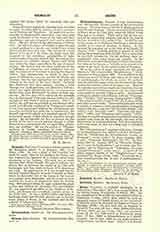

Grimmelshausen, JOHANN JACOB CHRISTOFFEIL VON, the greatest German novelist of the seventeenth century. What we know of his life is largely gathered from his own writings. He was born near Gelnhausen in Hesse about the year 1625, when the Thirty Years War was at its height. While still a boy he was carried off by marauding troopers, and until the close of the war in 1648 he led a soldier’s life. In 1667 he was in the service of the Bishop of Strasburg as Schultheiss (bailiff) in the town of Renchen in Baden. In this position he remained up to the time of his death, August 17, 1676. Nothing definite is known of his life during the period from 1648 to 1667; but it seems that he travelled extensively, for his writings show acquaintance with many lands and peoples. In the earlier part of his life Grimmelshausen was a Protestant, but later on he became a Catholic, as is attested by a notice of his death in the parish-record of Renchen.
He is the author of many romances, but the most famous is “Der abenteurliche Simplicissimus”, which appeared at Mompelgard, 1669. It is modeled on the picaresque novels of Spain and relates in the form of an autobiography, for which, no doubt, the author’s own life furnished many traits, the fortunes of the hero during the troublous times of the great war. Many of the episodes narrated are coarse and repulsive, but are related with never-failing humor, and the whole work is pervaded by a deeply religious spirit. A number of writings in similar vein followed, such as “Trutzsim plex” (1670?), “Der seltzame Springinsfeld” (1670), “Das wunderbarliche Vogel-Nest” (in 2 parts, 1672), and other minor works. Grimmelshausen also wrote a number of romances in the heroic-gallant manner in vogue in his day; such are “Der keusche Joseph“, his earliest work (probably 1667), “Dietwald and Amelinde” (1670), and “Proximus and Lympida” (1672). The last two works mentioned were published with the author’s real name on the title-page; for most of his other works he used pseudonyms, that were anagrams of his real name, so that for a long time it remained unknown.
The “Simplicissimus”, together with other writings of Grimmelshausen, was edited by Keller (Stuttgart, 1854-62, “Bibliothek des Litterarischen Vereins zu Stuttgart”, xxxiii, xxxiv); by Kurz (Leipzig, 1863, 4 vols., “Deutsche Bibliothek”, III—VI); by Tittmann (2nd ed., Leipzig, 1877, in “Deutsche Dichter des 17. and 18. Jahrhunderts”, ed. Goedeke and Tittmann); and by Bobertag (in “Kürschners Deutsche National Litteratur”, xxxiii—xxxv). A reprint of the oldest original edition of the “Simplicissimus” was published by Kogel (Halle, 1880, “Neudrucke deutscher Literaturwerke des 16 and 17 Jahrhunderts”, xix—xxv).
ARTHUR F. J. REMY

